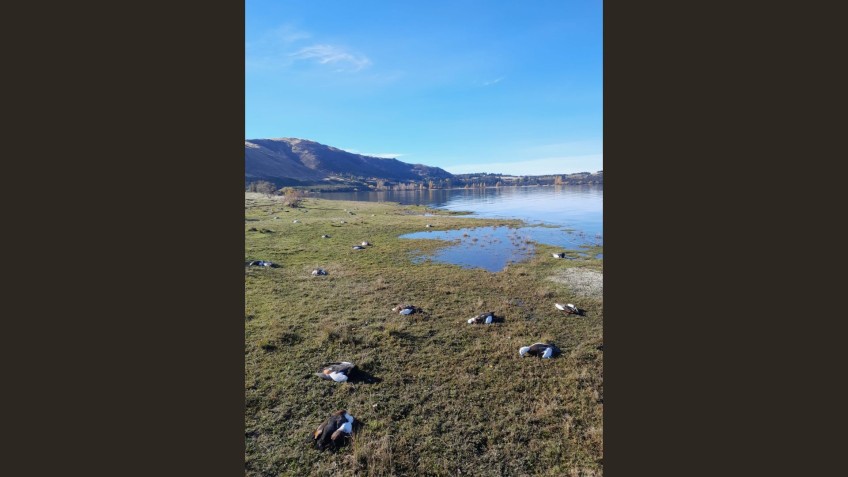Fish & Game 'dismayed' as MPI closes case on Wānaka's 100 dead birds

The Ministry of Primary Industries has stopped its search for the cause of 100 bird fatalities on Wānaka lakefront in late April after ruling out any exotic disease.
The government biosecurity regulator says they have carried out "extensive testing" on samples provided of the dead birds, found on the shores of Dublin Bay by members of the public.
MPI's Biosecurity New Zealand deputy director general Stuart Anderson says they were looking to exclude bird flu and Newcastle Disease, and their testing did that.
However, Otago Fish & Game is still looking to identify the exact cause of the deaths, and thinks the investigation undertaken by MPI was not thorough enough considering the mass nature of the deaths.
The organisation says it is "dismayed" the ministry's testing did nothing more than rule out exotic disease rather than agricultural chemicals as well.
The bulk of the dead birds were native paradise shelducks, and Otago Fish & Game chief executive Zane Moss says "it is important to know the cause of any mass death of wildlife, especially native bird species".
Although the organisation is not suggesting the mass bird deaths were intentional, it thinks they may have been the result of poisoning by insecticide diazinon.
"But we need this confirmed.
"It’s unacceptable that a not-for-profit organisation like Fish & Game has to use licence holder funds to complete an investigation we believe is the responsibility of MPI."
But Mr Anderson says any further testing would be outside the ministry's remit, although they did try to assist regardless.
He says they reached out to other laboratories to see if they were able to do the testing that Fish & Game wanted.
"We discussed with Fish & Game that our role was exotic disease testing, which is what we are funded to provide, and our laboratory would not do toxicology testing."
He pushes back at any suggestion the authority did not do its due diligence, saying it is inaccurate to suggest MPI is “disinterested” or “has walked away.”
He says they are not a commercial laboratory, and their main role is to investigate and respond to biosecurity risks threatening New Zealand's primary industries.
The team investigates all reports of multiple bird fatalities in New Zealand, and Mr Anderson says there are many instances every year.
He notes there's been an "uptick" in notifications in recent years, but reckons it's not a result of an increased amount of disease but, rather, heightened awareness.
"Large numbers of bird deaths are not uncommon. In many cases, botulism or toxic algal bloom was found to be the cause."
Other times investigations indicate starvation and storm-associated events as the likely cause, he says.
Earlier in April, 64 dead paradise shelducks were discovered dead in Te Anau, and Fish & Game has acknowledged the similar circumstances to the Wānaka case.


























